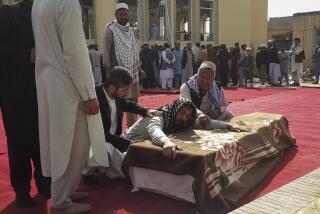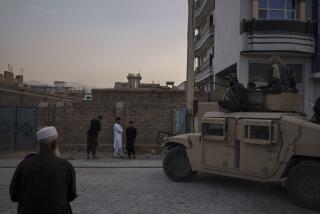U.S. Won’t Chase Enemy Into Pakistan
- Share via
WASHINGTON — The United States will not pursue Al Qaeda and Taliban fighters into Pakistan because it is satisfied that President Pervez Musharraf’s government is “working very hard to help us to stop them from coming across,” Defense Secretary Donald H. Rumsfeld said Monday.
Calling Musharraf “enormously cooperative,” Rumsfeld said Pakistani troops posted along the porous mountain border with Afghanistan have made “a good deal” of arrests of those who managed to cross. Last week, the American commander of the fierce battle in eastern Afghanistan’s Shahi Kot valley said U.S. troops might chase fleeing Al Qaeda forces into Pakistan.
Rumsfeld said he was far more concerned about the Afghan-Iranian border.
“There’s no question but that Iran has not been doing what Musharraf and the Pakistanis have been doing--indeed, quite the contrary,” Rumsfeld said in a Pentagon briefing. The Iranians have been “notably helpful” to fleeing Al Qaeda and Taliban fighters, he added.
“There’s no doubt at all but that people have been moving back and forth across that border, to the great disadvantage of the interim government of Afghanistan and the Afghan people,” Rumsfeld said.
Blocking the borders has become a crucial focus in the U.S.-led military campaign because Pentagon strategists believe that Al Qaeda fighters are seeking to regroup in Afghanistan, neighboring countries and other regional nations such as Yemen to plot acts of terrorism. Pentagon officials fear that a reconstituted Al Qaeda could mount new attacks within months.
The officials note that the battle at Shahi Kot involved Al Qaeda and Taliban fighters who apparently had assembled there. U.S. forces searching the area after the battle have found small arms, mortars, rocket-propelled grenades, heavy machine guns, computers, manuals, passports, phone lists, maps and bomb-making notes that indicate an active terror movement, Gen. Richard B. Myers, chairman of the Joint Chiefs of Staff, said at the briefing.
Separately, Myers said that, over the weekend, U.S. forces in the southern province of Kandahar found a laboratory containing equipment that could be used to make anthrax. It looked as though someone had tried to destroy the gear, which included a dryer and an autoclave, Myers said. Not all the equipment needed to make anthrax was found, and there was no evidence that the occupants had been able to turn the powder into a weapon, he said.
Swabs of substances at three of five such labs in Afghanistan turned up evidence of anthrax and ricin, a toxin made from castor bean plants. But the samples were in trace amounts that might have occurred naturally, a defense official said.
Rumsfeld and Myers also offered the first details of how the U.S. Army will train a new Afghan military. U.S. soldiers--numbering in the “low hundreds at most,” Myers said--will put Afghan troops through 10-week training cycles at the squad, platoon, company and battalion levels.
Afghan officers are expected to take over training by the end of the year, and the program should be complete within 18 months.
The size and cost of the U.S. training effort are still under discussion. The trainers would come from Army Special Forces soldiers already in Afghanistan.
Myers said interim Prime Minister Hamid Karzai told him several weeks ago in Afghanistan that forming an Afghan army was among his top priorities.
“He was emphatic in stating that he did not want us to do this job for him but wanted us to provide the wherewithal so the Afghans could do it for themselves,” Myers said in the briefing. “So this training effort is in that spirit.”
More to Read
Sign up for Essential California
The most important California stories and recommendations in your inbox every morning.
You may occasionally receive promotional content from the Los Angeles Times.










